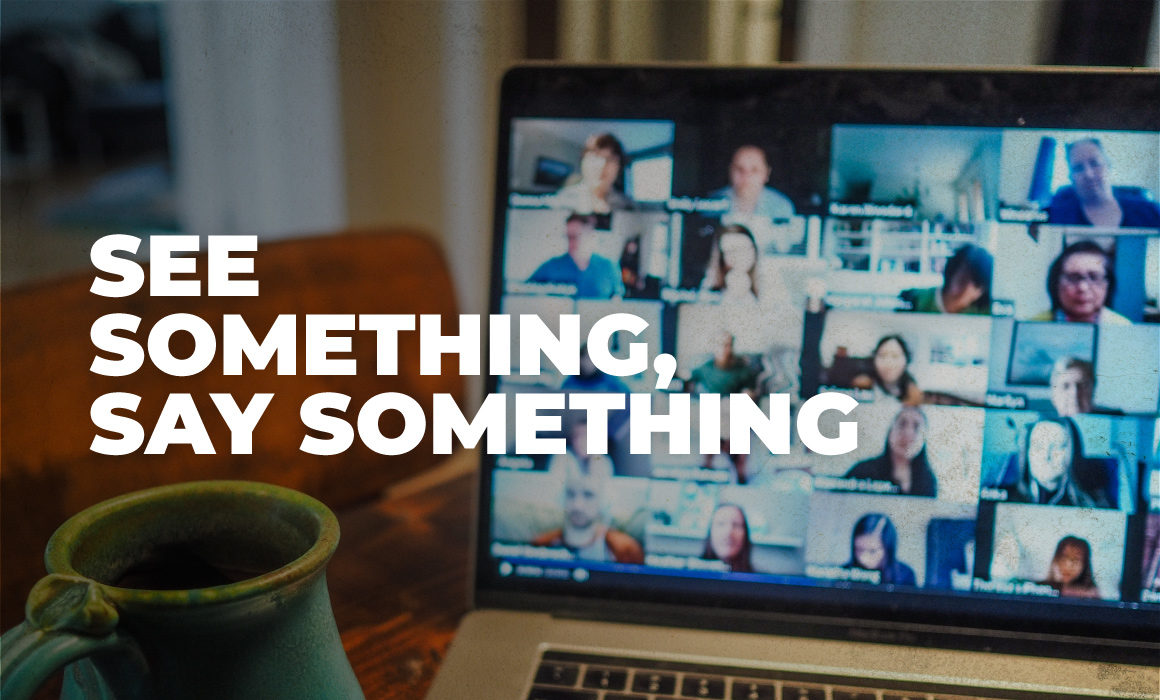See Something, Say Something
For “my whole wide life” as I used to say as a kid, I’ve spoken up – often too much, too loud, too fast, but I spoke up. Teachers would write, “Great to have in class, but she talks to her neighbors a little too much.” As I matured, I had to learn to keep my fast brain and mouth from speaking up inappropriately. But recently, I had the opportunity to speak up and I didn’t, and I’ve regretted it ever since.
The situation was one in which, on a Zoom event focused on how the city is preparing to host the NCAA tournament, a local man on the call made a racist, homophobic statement about downtown Indianapolis. As participants on the call, we were stunned, but unfortunately stunned into silence. Our minds raced as to what the right thing was to say, and one of the discussion leaders made good points about downtown. And I countered the man’s statement saying that I, and many others, feel very differently than he does. But I didn’t hit it head on. I didn’t say, “I’m offended by that statement.”
See something, say something. Too often, I’ve regretted (“gotten in trouble”) for speaking up, rather than staying quiet, but in this case, when someone made an ignorant, irresponsible statement in a group setting, I was stunned and didn’t say anything. As I sat there wrestling with what was the right thing to say, I got nowhere and said nothing.
In discussing it with others after the meeting, especially friends of color, along with the studying, reading and discussing I’ve been doing over the past year, this situation reinforced some thoughts that may be helpful for others searching for the perfect response:
- Your response may not be perfect, but it is something.
- Your response may not be perfect, but it may keep the conversation from spiraling into something worse.
- Your response may not be perfect, but, if you’re white and in this situation, it is appropriate for a white person to speak up to another white person and not expect a BIPOC member of the group to speak up.
- Your response may not be perfect, but it will show others where you stand.
- Your response may not be perfect, but it must be authentic.
There are many parts of White Fragility (which I’m reading along with other members of the CICF Board) that speak to this: We clam up when we’re uncomfortable. Impact (“what you said was painful”) is more important than Intent (“I didn’t mean to be offensive”) when speaking.
We need to stop and ask ourselves: What can I do to make this situation better? Not to change the offender’s mind, but to improve the situation. We used to think that ignoring it made it better – didn’t give the negative statement “air” – but what we’ve learned is that ignoring it is like letting a toxic substance remain in the room, rather than cleaning it up.
As employers, friends and colleagues, we need to tell each other that we all have the power and responsibility (and expectation) to speak up in the face of these scenarios, and it’s worth exploring why, in the moment, we sometimes stop ourselves.
Companies that are predominantly white are learning how to create a culture where speaking up against intolerance and hate is expected and supported. Empowering your employees to end/leave a meeting or be direct when someone says something offensive or makes them uncomfortable demonstrates that you value them, and that doing the right thing is supported above all else.
I’ve become convinced that it’s like building muscle memory. The more we speak up and address challenging situations, the easier it will be to do so next time. When I responded to the offender from the meeting by sending a well thought out email afterward, I wasn’t trying to change him, but to build my own muscle on how to put my thoughts into words, and to hit send, even while shaking a bit.
We’re educating ourselves and helping clients, partners and others to be better. We’re imperfect, but are dedicated to learning, showing empathy and speaking up when we know better. I’m trying to build the muscle to do it every time.


